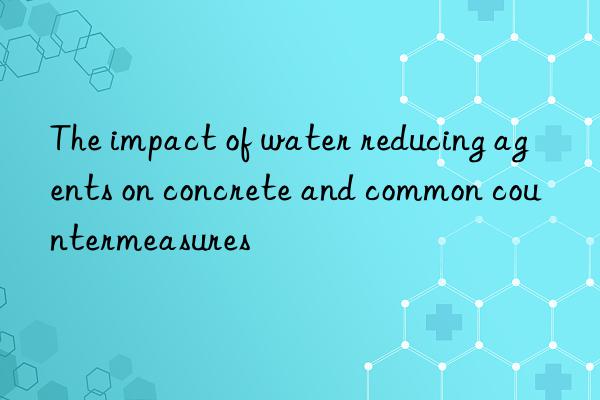
Water-reducing agents play a vital role in adjusting and improving the performance of concrete. Here are some effects of water-reducing agents on concrete and countermeasures:
Affecting the slump of concrete
Normally, practitioners will add a sufficient amount of water-reducing agent to the concrete to increase the slump of concrete, which can effectively improve the cohesion of freshly mixed concrete. Experience shows that the slump of damage within 1 hour of concrete without water-reducing admixture is less than that of concrete with water-reducing admixture. The main reason for this "weird" phenomenon is that the concrete is mixed with water-reducing agent. After using the water-reducing agent, you must also go through the mixing, transportation, and concrete pouring processes. Therefore, at the concrete construction site, water must be released to repair the slump of concrete that has been mixed with water-reducing agents. This will significantly reduce the strength and other properties of the concrete, causing cracks in the concrete and the occurrence of hard lumps. Reasonable and legal mixing of portions can not only effectively avoid the problem of concrete slump damage, but also control product costs to a certain extent and maximize the profit of concrete pouring.
The impact of excessive intake of water-reducing agent on concrete
The impact of various adverse factors, the impact of water-reducing admixture in the concrete during the entire construction process of the specific project The quality often exceeds the standard, and the amount of water-reducing agent added exceeds the standard, which has a negative impact on the performance of the concrete. Therefore, practitioners must strictly abide by the national requirements on the intake of concrete admixtures. Before adding water-reducing agents, construction companies must assign professional technicians to carry out concrete trial mixing work to determine the best way to reduce water-reducing admixtures. Water agent intake ensures reliable quality of concrete.
Gas introduction
After adding water reducing agent to concrete, the gas content inside the concrete will increase significantly. Generally speaking, if there are enough uniform bubbles inside the concrete, the bleeding flow rate of the concrete will be greatly reduced, and the cohesion can be reasonably improved. And can improve the impermeability grade of concrete to a certain extent. However, in some cases, adding superplasticizer to concrete will not only fail to improve the properties of the concrete, but will in turn drastically reduce the compressive strength and tensile strength of the concrete.
By conducting a large number of controlled variable experiments, technicians found that the air content of concrete has a very important impact on the properties of concrete. Air-entraining water-reducing agents have strong asymmetry, but this does not mean that air-entraining water-reducing agents cannot be used. As long as practitioners pay attention to the use of air-entraining water-reducing agents in the process of This problem can be solved by controlling the air content within an effective range.
Adaptability problem
During the concrete mixing work, before adding a small amount of water-reducing agent to the concrete, the condition of concrete hard lumps changed abnormally. After more than ten minutes, the concrete solidified The speed suddenly becomes faster, which means a rapid setting situation occurs. Therefore, when practitioners find that the fluidity of concrete becomes worse after adding qualified water-reducing admixtures or rapid setting occurs, they cannot choose the construction method of forced water release, but should look for solutions based on the adaptability of concrete and water-reducing admixtures. Precautions. </p



 微信扫一扫打赏
微信扫一扫打赏
